新编英语教程第三版第二册Unit3课文翻译
- 格式:pdf
- 大小:562.74 KB
- 文档页数:9
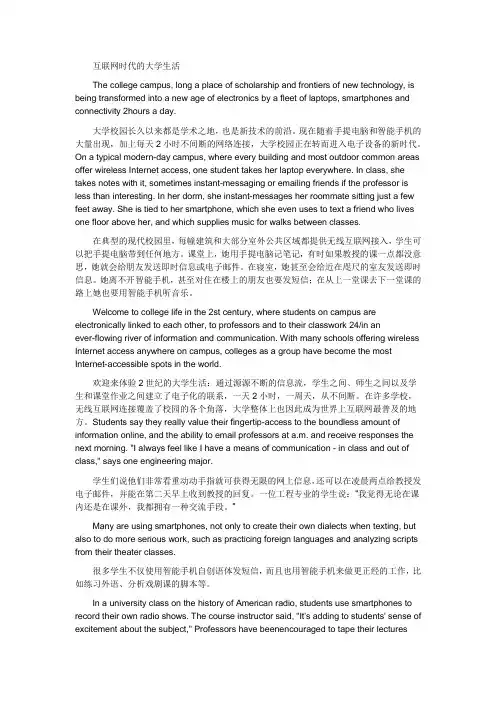
互联网时代的大学生活The college campus, long a place of scholarship and frontiers of new technology, is being transformed into a new age of electronics by a fleet of laptops, smartphones and connectivity 2hours a day.大学校园长久以来都是学术之地,也是新技术的前沿。
现在随着手提电脑和智能手机的大量出现,加上每天2小时不间断的网络连接,大学校园正在转而进入电子设备的新时代。
On a typical modern-day campus, where every building and most outdoor common areas offer wireless Internet access, one student takes her laptop everywhere. In class, she takes notes with it, sometimes instant-messaging or emailing friends if the professor is less than interesting. In her dorm, she instant-messages her roommate sitting just a few feet away. She is tied to her smartphone, which she even uses to text a friend who lives one floor above her, and which supplies music for walks between classes.在典型的现代校园里,每幢建筑和大部分室外公共区域都提供无线互联网接入,学生可以把手提电脑带到任何地方。
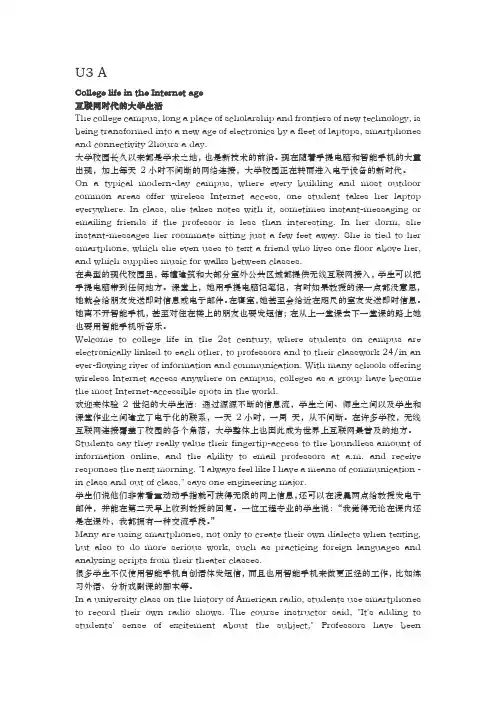
U3 ACollege life in the Internet age互联网时代的大学生活The college campus, long a place of scholarship and frontiers of new technology, is being transformed into a new age of electronics by a fleet of laptops, smartphones and connectivity 2hours a day.大学校园长久以来都是学术之地,也是新技术的前沿。
现在随着手提电脑和智能手机的大量出现,加上每天2小时不间断的网络连接,大学校园正在转而进入电子设备的新时代。
On a typical modern-day campus, where every building and most outdoor common areas offer wireless Internet access, one student takes her laptop everywhere. In class, she takes notes with it, sometimes instant-messaging or emailing friends if the professor is less than interesting. In her dorm, she instant-messages her roommate sitting just a few feet away. She is tied to her smartphone, which she even uses to text a friend who lives one floor above her, and which supplies music for walks between classes.在典型的现代校园里,每幢建筑和大部分室外公共区域都提供无线互联网接入,学生可以把手提电脑带到任何地方。
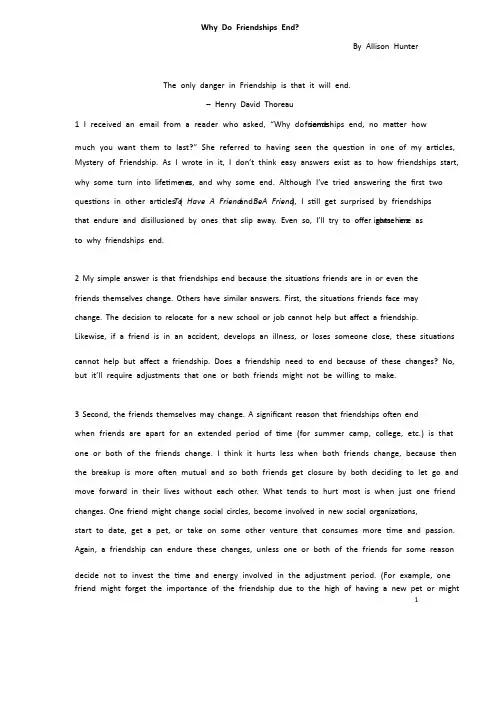
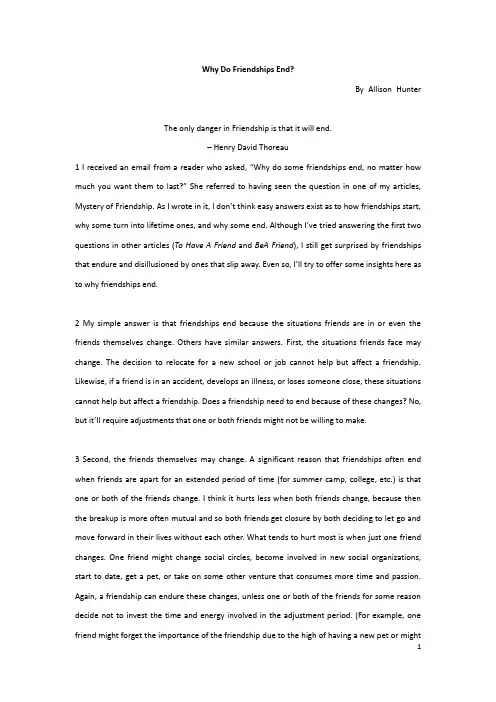
Why Do Friendships End?By Allison HunterThe only danger in Friendship is that it will end.– Henry David Thoreau1 I received an email from a reader who asked, “Why do some friendships end, no matter how much you want them to last?” She referred to having seen the question in one of my articles, Mystery of Friendship. As I wrote in it, I don’t think easy answers exist as to how friendships start, why some turn into lifetime o nes, and why some end. Although I’ve tried answering the first two questions in other articles (To Have A Friend and BeA Friend), I still get surprised by friendships that endure and disillusioned by ones that slip away. Even so, I’ll try to offer some ins ights here as to why friendships end.2 My simple answer is that friendships end because the situations friends are in or even the friends themselves change. Others have similar answers. First, the situations friends face may change. The decision to relocate for a new school or job cannot help but affect a friendship. Likewise, if a friend is in an accident, develops an illness, or loses someone close, these situations cannot help but affect a friendship. Does a friendship need to end because of these changes? No, but it’ll require adjustments that one or both friends might not be willing to make.3 Second, the friends themselves may change. A significant reason that friendships often end when friends are apart for an extended period of time (for summer camp, college, etc.) is that one or both of the friends change. I think it hurts less when both friends change, because then the breakup is more often mutual and so both friends get closure by both deciding to let go and move forward in their lives without each other. What tends to hurt most is when just one friend changes. One friend might change social circles, become involved in new social organizations, start to date, get a pet, or take on some other venture that consumes more time and passion. Again, a friendship can endure these changes, unless one or both of the friends for some reason decide not to invest the time and energy involved in the adjustment period. (For example, one friend might forget the importance of the friendship due to the high of having a new pet or mightfeel that the change is impossible to overcome when one gets married but the other is still single.) In this situation, breakups may not be mutual and so one or both friends feel betrayed and end up with bitter memories about what was a precious friendship to them.4 There are other reasons why friendships end. For example, as much as two people might wanta friendship to survive, oneor both of them might unintentionally neglect it. Friendship is often compared to a flower garden. Wel l, if flowers don’t get exposed regularly enough to sunlight and don’t get watered enough, flowers will wither and even die. The same applies to friendship. If week after week passes where plans are made to spend time together but are never honored, perhaps due to taking a friendship for granted, eventually even the closest of friendships may cease to have a reason to exist.5 Conflicts can also cause the end of friendships. If the flower is a fledgling plant, one blow might destroy it just as sometimes re latively young friendships aren’t strong enough to endure much conflict. Even those amazing close friendships, where friends love us no matter what our faults are, need care when it comes to conflicts. Sure, if a flourishing flower gets stepped on, it might revive on its own. Moreover, if it gets a little extra special care, it’ll probably bounce back as if it hadn’t ever been injured. At the same time, if a flower gets repeatedly trampled on, it’ll probably eventually break. Especially the friendships that have been around for a long time can endure storms, and even become stronger for them, but most friendships have breaking points.6 Nevertheless, while we can rarely predict at the outset which ones will last, most friendships do enrich us for however sh ort or long they’re a part of our lives.为什么友谊会终结?艾利森·亨特友谊内在的唯一危险是:友谊将会终结。
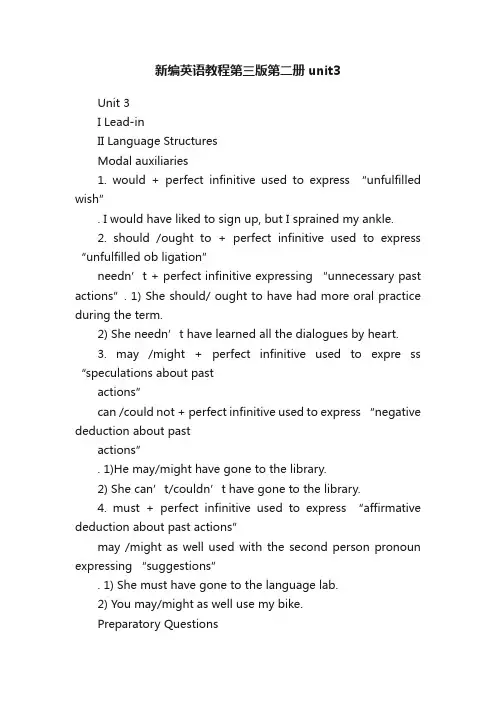
新编英语教程第三版第二册unit3Unit 3I Lead-inII Language StructuresModal auxiliaries1. would + perfect infinitive used to express “unfulfilled wish”. I would have liked to sign up, but I sprained my ankle.2. should /ought to + perfect infinitive used to express “unfulfilled ob ligation”needn’t + perfect infinitive expressing “unnecessary past actions”. 1) She should/ ought to have had more oral practice during the term.2) She needn’t ha ve learned all the dialogues by heart.3. may /might + perfect infinitive used to expre ss “speculations about pastactions”can /could not + perfect infinitive used to express “negative deduction about pastactions”. 1)He may/might have gone to the library.2) She can’t/couldn’t have gone to the library.4. must + perfect infinitive used to express “affirmative deduction about past actions”may /might as well used with the second person pronoun expressing “suggestions”. 1) She must have gone to the language lab.2) You may/might as well use my bike.Preparatory QuestionsDirections: Recast the followingsentences using the following phrases: 1. “would have liked to (do)”Notice: would have liked to (do) is used with the first person to express the spe aker’s wish that was not fulfilled.1) I intended to go skating with you yesterday but I couldn’t because my mother didn’t let me.(Response: I would have liked to go skating with you yesterday, but my mother didn’let me.)2) I meant to sit in on Professor Wang’s class this morning but I didn’t because I had an important meeting to attend. (Response: I would have liked to sit in on Professor Wang’s class this morning, but I had an important meeting to attend.)3) I intended to take part in the basketball match yesterday afternoon but I couldn’tbecause I had a bad fall yesterdaymorning.(Response: I would have liked to take part in the basketball match yesterday afternoon, but I had a bad fall yesterday morning.)4) I planned to lend you my cassette recorder, but I didn’t, because it was out of order.(Response: I would have liked to lend you my cassette recorder, but it was out of order.)2. should/ought to + perfect infinitive Notice:should/ought to + perfect infinitive, indicating a past obligation that was not fulfilled1) The exhibition was a good one. All of us visited it except John. (Response: : John should/ought to have come with us.)2) We all learned a lot from the lecture,but Li didn’t attend it. (Response: : Li ought to/should haveattended the lecture.)3) The engineer went to the research institute without an umbrella and was caught in the rain.(Response: : The engineer ought to/should have taken an umbrella with him.)4) They bought a book for Mary but she didn’t like it.(Response: : They oug htn’t to/shouldn’t have bought the book for Mary.)needn’t + perfect infinitiveNotice: needn’t + perfect infinitive, indicating something that was unnecessarily done in the past1) I wrote a summary in more than five hundred words. But the teacher only asked for200 words.(Response: : I needn’t have written such a long summary.)2) Lin answered all the ten questions in the test paper. But we were only required toanswer eight of them.(Response: : Lin needn’t have answered all the ten questions in the test paper.)3) Mary went to the station an hour before the train started. (Response: : Mary needn’t have gone to the station so early.)4) Yao carried all the parcels home herself. She didn’t know they would deliver them if she asked them.) (Response: : Yao needn’t have carried all the parcels home herself. They would havedelivered them if she had asked them.) 3.may/might +perfect infinitiveNotice: may/might +perfect infinitive, indicating speculations about past actions1) Where is Susan I want to go to the canteen with her.(Response: : She may/might have gone there already.)2) It’s a fortnight since Sun went to the South and we haven’t got a word from him. Iwonder if he’s forgotten us all. (Response: : He may/might have been very busy with his work there.)3) Sid told me he’d let me have the library book after he’d finished wit h it. It’s a weeksince he said that and he still hasn’t given me the book.(Response: : He may/might have returned the book to the library.4) I’ve been looking for my bicycle key for three days, and it’s still nowhereto be found.(Response: : You may/might have lost it.)can’t/couldn’t + perfect infinitive Notice: can’t/couldn’t + perfect infinitive, indicating negative deduction about past actionsThe first part of the response can be given to the students asa prompt.1) Where is my typewriter Someone must have stolen it last night. (Response: : It was here a moment ago. It couldn’t have been stolen last night.)2) Keith ought to be here now. Perhaps he’s lost his way.(Response: : I told him how to come and I even drew him a map. He can’t have lost his way.)3) Who brought the refrigerator upstairs Perhaps it was Tim.(Response: : Tim’s not that strong. He couldn’t have brought it by himself.)4) A man answered the phone. I suppose it was her husband.(Response: : But her husband hasn’t come back from abroad yet. It couldn’t have been her husband.)4. must + perfect infinitiveNotice: must + perfect infinitive, indicating affirmative deduction about past actions1) The film he saw last night was wonderful.(Response: : He must have enjoyed seeing it.)2) He looks tired, doesn’t he (Response: : He must have worked hard. / He must have stayed up late last night.)3) The children were making a lot of noise until five minutes ago. Now it isso quiet.(Response: : The children must have gone away.)4) James has checked all the figures twice over, but he can’t get the correct answer.(Response: : James must have made a mistake somewhere.)5. may/might as wellNotice: may/might as well, used with the second person pronoun to express the speaker’ssuggestion(s)1) I am so exhausted after work. (Response: : You may/might as well go to sleep.)2) I’m not feeling well. I think I’ve got a cold.(Response: : Being so weak, you may/might as well see a doctor.)3) It is too hot for Karen and me to gofor a picnic.(Response: : Why don’t you change it to another day You may/might as well go to amovie today.)4) Nick won’t take up the additional work. He just wants to do his part. (Response: : You may/might as well ask Lucy to do it. To get ahead on her job, she iswilling to try new things.)Dialogue Pollution ControlA.Listening to the recordingB.Questions on the dialogue1.Why is London no longer a city full of fog2.What is the cause of air and water pollution in the city where A lives3.What problems do car bring4.What should be done to bringpollution in China completely under control5.Do you think that environmental pollution in China has been effectively reduced If so, please cite some facts or examples.C. Language Points1.It must be terrible living there.—Living there must be terrible. The introductory it is a formal subject, whereas the -ing participle living is the real subject. Another example,. It is great fun boating on the lake.2. the Clean Air Ac t — This was theresult of the recommendations made by the Beaver Committee which was set up to inquire into the question of urban pollution in Britain. The committee was so named because its chairman was Sir Hugh Beaver.3. enforce v .give emphasis or strengthto sth.加强;make sth.(a law ) obeyed or effective by force强迫服从,实施;force or cause sth. to be done or to happen迫使(某事)发生. 1) Mike must provide enough examples to enforce hisargument.2) You have no right to enforce your own views on me.3) The government is unable to enforce its own laws and regulations.4. the Thames/temz/is swarming with fish — the River Thames is full of fish that move about busily. The names of rivers are preceded by the definite article the, ., the Yangzi River, the Yellow River, the Hudson River, the River Mississippi.. 1)Each summer the swimming pool swarms with people.2) That town is always swarming with tourists from all over the world.5. double: twice as much or as many as usual; 成双的,双重的,两倍的a. n. v.a double bed/room at/on the double 迅速地,立即地;以跑步方式The boss will give him double pay for working overtime.2) The date had a double significance.3) You’d better be double careful when crossing the street.4) The population of Japan doubles that of Canada.5) The child birthrate in that area has doubled.6. torment n. extreme suffering, especially mental suffering;a person or thing that causes this.痛苦,折磨 v. . 1) Love is a sweet torment.2) David has never suffered the torment of rejection.3)They never torment themselves or each other over imperfections.devices—devices used to treat smoke, dust, and water pollution 治理三废设备. 1) The television receiver is an electronic device.2) Sending advertising by email is very effective marketingdevice.3) His illness is merely a device to avoid seeing his girlfriend.8. residential a. containing or suitable for private houses; connected with or based on residence住宅的,与居住有关的Gradually the surrounding farmland turned into residential areas.2) It is a nice residential section, equipped with modern conveniences.resident a. 居住的;n.居民,居住者residence n. 居住,住宅reside v.居住,定居v. make ab. angry, annoyed or impatient 激怒,使烦躁;cause discomfort to(a part of body)使不舒服,刺激. 1) Our faults irritate us most when we see them in others.2) Her effusive manner of greeting her friends finally began to irritate them.3) These tight shoes irritate my toes.10. more and more people have come to know how harmful ... —more and more people begin to know how harmful ... The infinitive after the verb come expresses an action that takes place gradually over some time.working with Mrs. Brown, who appeared quite hard-hearted, in the same officefor many years, I’ve come to see that she has a heart of gold.11. make stricter laws to that effect—make stricter laws with the intention to forbid car horns blowing in the streets. The word effect refers to what B says in the preceding line “it’s against the law to blow car horns in any street in town.”to that effect:used to show that you’re giving the general meaning of what sb. has said or written rather than te exact words表示那个/这个意思,大意如此)He said he was greatly worried, or words to that effect.2) Mary said she hated to see John, or hear of the words to that effect.to this/the effect 大意是说to good/great/ dramatic effect 产生好的结果to no effect 无效果,不起作用Expressions in Focus1. “do away with...”—terminate, get rid of; abolish sth. .. 1) Why not do away with all the junk in your room It is getting more and more untidy!2) How could they do away with a lovely old building like that and put a car park there instead3) These ridiculous rules and regulations should have been done away with years ago.2. “add to…”— increase or have an increased effect;“add sth. to sth.” —put sth. together with sth. else so as to increase .His words did nothing but added to my anger.2) The bad weather only added to our difficulties.3) Teachers should exercise their imagination and add art to their teaching.3. “bring…under control”—subdue or master sth.To bring the noisy children under control, the teachers told them the story of “Buzzy Bees”.2) Hundreds of firemen have brought a wildfire spread over nine square kilometers of land under control after battling to put out the flames for two days.3) The Prime Minister said yesterday that the government is making all efforts to bring the high inflation under control.D. Retelling。
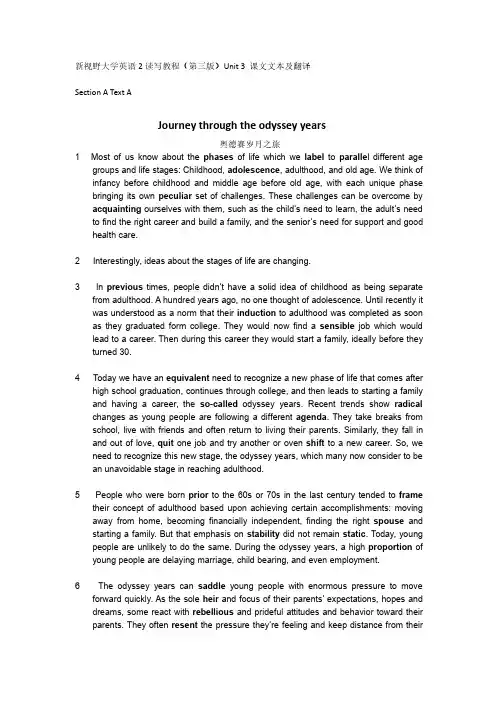
新视野大学英语2读写教程(第三版)Unit3课文文本及翻译Section A Text AJourney through the odyssey years奥德赛岁月之旅1Most of us know about the phases of life which we label to paralle l different age groups and life stages:Childhood,adolescence,adulthood,and old age.We think of infancy before childhood and middle age before old age,with each unique phase bringing its own peculiar set of challenges.These challenges can be overcome by acquainting ourselves with them,such as the child’s need to learn,the adult’s need to find the right career and build a family,and the senior’s need for support and good health care.2Interestingly,ideas about the stages of life are changing.3In previous times,people didn’t have a solid idea of childhood as being separate from adulthood.A hundred years ago,no one thought of adolescence.Until recently it was understood as a norm that their induction to adulthood was completed as soon as they graduated form college.They would now find a sensible job which would lead to a career.Then during this career they would start a family,ideally before they turned30.4Today we have an equivalent need to recognize a new phase of life that comes after high school graduation,continues through college,and then leads to starting a family and having a career,the so-called odyssey years.Recent trends show radical changes as young people are following a different agenda.They take breaks from school,live with friends and often return to living their parents.Similarly,they fall in and out of love,quit one job and try another or oven shift to a new career.So,we need to recognize this new stage,the odyssey years,which many now consider to be an unavoidable stage in reaching adulthood.5People who were born prior to the60s or70s in the last century tended to frame their concept of adulthood based upon achieving certain accomplishments:moving away from home,becoming financially independent,finding the right spouse and starting a family.But that emphasis on stability did not remain static.Today,young people are unlikely to do the same.During the odyssey years,a high proportion of young people are delaying marriage,child bearing,and even employment.6The odyssey years can saddle young people with enormous pressure to move forward quickly.As the sole heir and focus of their parents’expectations,hopes and dreams,some react with rebellious and prideful attitudes and behavior toward their parents.They often resent the pressure they’re feeling and keep distance from theirparents or even run away from home.Their confusion comes from the difficulties to make parents understand them and fluid journey of discovery they need in this phase of their lives.To get away from this confusion and upset,many young people resort to computer games,iPods,iPhones,or iPads to help distract them from their pain and stress.7Likewise,their parents are feeling more anxious.They may make allowances for a transition phase from student life to adult life,but they get upset when they see the transition of their grown children’s lives moving away from their expectations and stretching give years to seven years,and beyond.The parents don’t even detect a clear sense of direction in their children’s lives.They look at them and see the things that are being delayed.8It’s hard to predict what’s next.New guidelines haven’t been established yet,and everything seems to give way to a less permanent version of itself.There’s been a shift in the status and balance of power between the genders,too.More women are getting degrees than men.Male wages have remain stable over the past decades, while female wages have boomed.9Apart from anything else,this has had an implici t effect on cated women can get many of the things they want,such as security,accomplishment,and identity without marriage.However,both genders are having a harder time finding suitable mates to build their lives with.Considering all of this,it’s beneficial to know that even though graduates are delaying many things after college,surveys show they still hold highly traditional aspirations.For example,this contemporary generation rates parenthood even more likely than previous generations did!10This new phase will likely grow more pronounced in the coming years.Nations around the world have witnessed similar trends toward delaying marriage and spending more years than even shifting between higher education and settling down with a career and family.11Nevertheless,graduates shouldn’t be deceived into thinking they can back off simply because things have become more difficult.A large number of people chasing relatively fewer opportunities can create strong competitive pressure.So, from the outse t,keep your resume professional and up-to-date.12To reinforce this essential message,success moving through the odyssey years will come to those who don’t expect to achieve their goals right away but know that they must have the strength,capacity and confidence to endure over the long term.If you’re a little late with your goals,don’t feel like a failure!Stay strong,be positive, and keep focused!Someday you will look back and wonder at the vast changes as you passed through the odyssey years.1.我们大多数人都知道,根据不同的年龄和生活阶段。
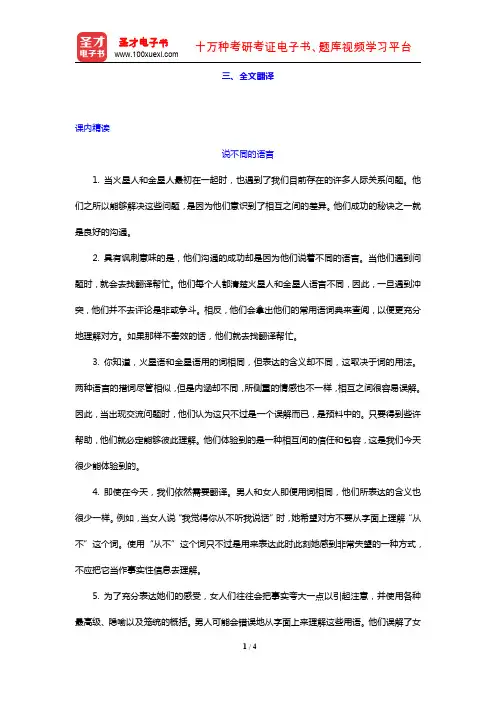
三、全文翻译课内精读说不同的语言1.当火星人和金星人最初在一起时,也遇到了我们目前存在的许多人际关系问题。
他们之所以能够解决这些问题,是因为他们意识到了相互之间的差异。
他们成功的秘诀之一就是良好的沟通。
2.具有讽刺意味的是,他们沟通的成功却是因为他们说着不同的语言。
当他们遇到问题时,就会去找翻译帮忙。
他们每个人都清楚火星人和金星人语言不同,因此,一旦遇到冲突,他们并不去评论是非或争斗。
相反,他们会拿出他们的常用语词典来查阅,以便更充分地理解对方。
如果那样不奏效的话,他们就去找翻译帮忙。
3.你知道,火星语和金星语用的词相同,但表达的含义却不同,这取决于词的用法。
两种语言的措词尽管相似,但是内涵却不同,所侧重的情感也不一样,相互之间很容易误解。
因此,当出现交流问题时,他们认为这只不过是一个误解而已,是预料中的。
只要得到些许帮助,他们就必定能够彼此理解。
他们体验到的是一种相互间的信任和包容,这是我们今天很少能体验到的。
4.即使在今天,我们依然需要翻译。
男人和女人即便用词相同,他们所表达的含义也很少一样。
例如,当女人说“我觉得你从不听我说话”时,她希望对方不要从字面上理解“从不”这个词。
使用“从不”这个词只不过是用来表达此时此刻她感到非常失望的一种方式,不应把它当作事实性信息去理解。
5.为了充分表达她们的感受,女人们往往会把事实夸大一点以引起注意,并使用各种最高级、隐喻以及笼统的概括。
男人可能会错误地从字面上来理解这些用语。
他们误解了女人想要表达的意思,便常常以不赞同的态度来回应她们。
下面列有十种容易被误解的抱怨,同时也列出了男人表示不赞同的可能的回答。
容易被误解的十种抱怨6.可以看出,习惯把语言用来传达事实和信息的男人们,从“字面”上去理解女人的话是多么容易产生误解。
也可以看出,男人的回答又是怎样引起争吵的。
含糊的、缺乏爱心的沟通是男女之间的最大问题。
女人们在交往中的第一大抱怨就是“我觉得没人听我说话。
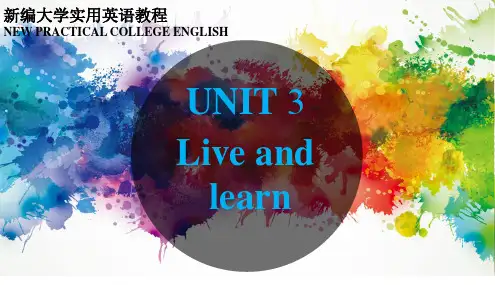
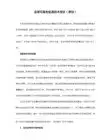
人文学科:过时了吗?当形势变得困难时,强者会去选学会计。
当就业市场恶化时,许多学生估算着他们不能再主修英语或历史。
他们得学一些能改善他们就业前景的东西。
数据显示,随着学生肩负的学费不断增加,他们已从学习人文学科转向他们相信有益于将来就业的应用科学和“硬”技能。
换言之,大学教育越来越被看成是改善经济而不是替身人类自身的手段。
这种趋势可能会持续,甚至有加快之势。
在未来几年内,由于劳动市场的不景气,人文学科可能会继续其长期低迷的态势。
在上一代大学生中,主修人文学科的学生数跌幅已近50%。
这种趋势会持续、甚至加速的想法是合情合理的。
人文学科曾是大学生活的重要支柱,而今在学生们参观校园的时候,却只是一个小点缀。
现在,实验室要比图书馆更栩栩如生、受人青睐。
在这儿,请允许我为人文学科给人们的生活所增添的真实价值进行支持和宣传。
自古以来,人们一直在思索人类自身具有什么神奇的内力使一些人变得崇高伟大,而使另一些人走向自我毁灭。
几个世纪以来,这股内力被称作很多东西。
著名的心理学家西格蒙德弗洛伊德称之为“潜意识”,或更为人熟知的“本能”。
从一开始,人类这股可以是建设性也可以是毁灭性的内在驱动力,就令我们心驰神往。
这些惊人的、充满内心挣扎的故事形成了世界文化的基础。
历史学家、建筑师、作家、哲学家和艺术家们以故事、音乐、神话、绘画、建筑、雕刻、风景画和传统的形式,捕捉到了这些撞击心灵的文字、形象及内涵。
这些男男女女创造出了具有艺术性的“语言”,帮助我们了解人类的这些强烈愿望,并用以教育一代又一代人。
从古时起开始的这些充满想象的大量作品,正是文明的底蕴,它奠定了人文研究的基础。
学习人文学科会提高我们的阅读和写作能力。
无论我们这一生中从事什么职业,如果我们能读懂复杂的思想并理解它们的内涵,我们都会受益匪浅。
如果我们是在办公室能对这些思想做出写出既明确又简洁的分析的人,我们会有光明的职业前景。
学习人文学科会让我们熟悉表达情感的语言及进行创造的过程。
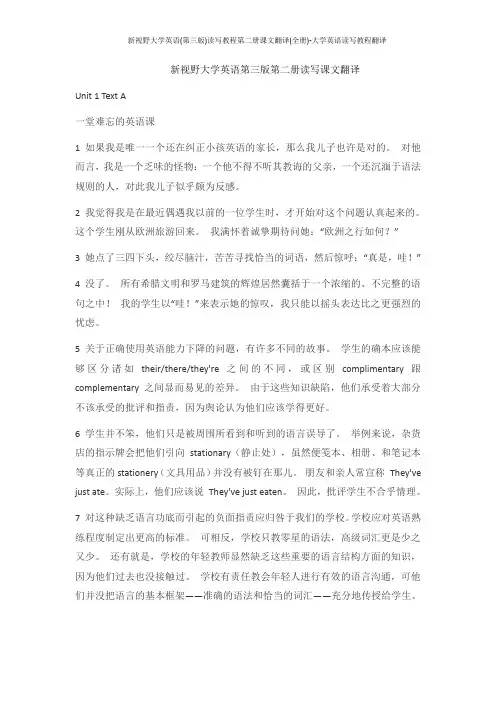
新视野大学英语第三版第二册读写课文翻译Unit 1 Text A一堂难忘的英语课1 如果我是唯一一个还在纠正小孩英语的家长,那么我儿子也许是对的。
对他而言,我是一个乏味的怪物:一个他不得不听其教诲的父亲,一个还沉湎于语法规则的人,对此我儿子似乎颇为反感。
2 我觉得我是在最近偶遇我以前的一位学生时,才开始对这个问题认真起来的。
这个学生刚从欧洲旅游回来。
我满怀着诚挚期待问她:“欧洲之行如何?”3 她点了三四下头,绞尽脑汁,苦苦寻找恰当的词语,然后惊呼:“真是,哇!”4 没了。
所有希腊文明和罗马建筑的辉煌居然囊括于一个浓缩的、不完整的语句之中!我的学生以“哇!”来表示她的惊叹,我只能以摇头表达比之更强烈的忧虑。
5 关于正确使用英语能力下降的问题,有许多不同的故事。
学生的确本应该能够区分诸如their/there/they're之间的不同,或区别complimentary 跟complementary之间显而易见的差异。
由于这些知识缺陷,他们承受着大部分不该承受的批评和指责,因为舆论认为他们应该学得更好。
6 学生并不笨,他们只是被周围所看到和听到的语言误导了。
举例来说,杂货店的指示牌会把他们引向stationary(静止处),虽然便笺本、相册、和笔记本等真正的stationery(文具用品)并没有被钉在那儿。
朋友和亲人常宣称They've just ate。
实际上,他们应该说They've just eaten。
因此,批评学生不合乎情理。
7 对这种缺乏语言功底而引起的负面指责应归咎于我们的学校。
学校应对英语熟练程度制定出更高的标准。
可相反,学校只教零星的语法,高级词汇更是少之又少。
还有就是,学校的年轻教师显然缺乏这些重要的语言结构方面的知识,因为他们过去也没接触过。
学校有责任教会年轻人进行有效的语言沟通,可他们并没把语言的基本框架——准确的语法和恰当的词汇——充分地传授给学生。
8 因为语法对大多数年轻学生而言枯燥且乏味,所以我觉得讲授语法得一步一步、注重技巧地进行。
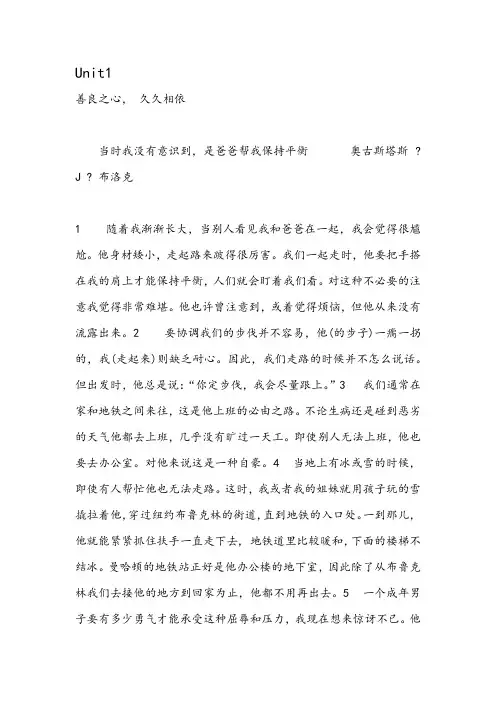
Unit1善良之心,久久相依当时我没有意识到,是爸爸帮我保持平衡奥古斯塔斯 ? J ? 布洛克1 随着我渐渐长大,当别人看见我和爸爸在一起,我会觉得很尴尬。
他身材矮小,走起路来跛得很厉害。
我们一起走时,他要把手搭在我的肩上才能保持平衡,人们就会盯着我们看。
对这种不必要的注意我觉得非常难堪。
他也许曾注意到,或着觉得烦恼,但他从来没有流露出来。
2 要协调我们的步伐并不容易,他(的步子)一瘸一拐的,我(走起来)则缺乏耐心。
因此,我们走路的时候并不怎么说话。
但出发时,他总是说:“你定步伐,我会尽量跟上。
”3 我们通常在家和地铁之间来往,这是他上班的必由之路。
不论生病还是碰到恶劣的天气他都去上班,几乎没有旷过一天工。
即使别人无法上班,他也要去办公室。
对他来说这是一种自豪。
4 当地上有冰或雪的时候,即使有人帮忙他也无法走路。
这时,我或者我的姐妹就用孩子玩的雪撬拉着他,穿过纽约布鲁克林的街道,直到地铁的入口处。
一到那儿,他就能紧紧抓住扶手一直走下去, 地铁道里比较暖和,下面的楼梯不结冰。
曼哈顿的地铁站正好是他办公楼的地下室,因此除了从布鲁克林我们去接他的地方到回家为止,他都不用再出去。
5 一个成年男子要有多少勇气才能承受这种屈辱和压力,我现在想来惊讶不已。
他从没有痛苦或抱怨,他是怎么做到这一步的我感到不可思议。
6 他从不把自己当作同情的对象,也从不对更幸运的或更能干的人表示任何嫉妒。
他在别人身上所寻找的是一颗“善心”。
如果他找到了一颗善心,那么有这么颗心的人对他来说就是一位大好人了。
7 由于年龄的增长,我相信那是一种用来判断人的恰当的标准,尽管我还不能精确地知道什么是一颗“善心”。
但是,当我自己没有的时候,我是知道的。
8 尽管很多活动我爸爸不能参加,但他还是尽量用某种方式参与。
当本地的一支棒球队发现缺经理的时候,他使它维持下去。
他是一个很懂行的棒球迷,经常带我去埃贝茨球场看布鲁克林的道奇队打球。
他喜欢参加舞会和聚会,就是坐在一旁观看,也很开心。
Unit 3 Door closer, are you?New words:rival a. 竞争的;对抗的 n. 对手;竞争者secondary a. 次要的;从属的imperial a. 帝国的;皇帝的raid n. 突袭;袭击 vt. (军队)突然袭击territory n. 领土;版图;领地opponent n. (竞争、比赛等的)敌手,对手;反对者motivate vt. 激励;激发...的积极性loyal a. 忠贞的;忠实的;忠诚的vessel n. 船;舰genius n. 天才;天赋;有天才的人;天才人物conviction n. 坚定地信仰(主张)validate vt. 证实;使生效;使合法化exception n. 例外;除外veteran a. 经验丰富的;老练的 n. 老兵;退伍军人conquest n. 击败;征服;攻占;(对艰难、危险事物的)攻克,征服summit n. 某事物的顶峰;某事物的极点;首脑会议;最高级会议;峰会enlighten vt. 启发;指导;教导enlightening a. 具启发性的publication n. 书;杂志;著作;出版物;出版irrational a. 非理性的;不合理的;荒谬的investigate vt. 查明,调查,侦查(犯罪、事故或科学问题的真相)investigation n. (对犯罪、事故或科学问题等进行的正式的)调查,侦查marshal vt. 整理(思路、想法等)behavioral a. 行为的;行为方式的profit v. 使...得到;有利于n. 利润;收益;盈利revolve v. (使)旋转preserve vt. 维护;保护;保存session n.(一批人参加某项活动的)一段时间fluctuate vi. 波动;起伏;涨落modify vt. 改动;修改;更改visual a. 视觉的;视力的protest v. 坚持说;力言;公开反对;抗议cling vi. 坚持,墨守(某事物);(尤指感觉不安全而)紧紧抓住(抱住)factor n. 因素;要素underneath prep. 在...里面;在...背后;在...下面;在...底下temporary a. 暂时的;临时的restore vt. 恢复implement vt. 实施;执行;贯彻delegate vt. 授权,委托(权限)(给下级);下放(权力)n. 代表prune vt. (尤指为缩减规模或降低成本)消减,裁减discard vt. 扔掉;弃置outward a. 外表的;表面的prejudice vt. 使有偏见;使有意见;n. 成见;偏见prejudiced a. 有成见的;有偏见的dose n. 一份;一点;(药物的)一剂,一服;一次服用量respective a. 各自的;分别的Phrases and expressions:impose sth. on sb. 将...强加于...be featured in 在...中被专题介绍;被特写profit from 从...中受益revolve around 以...为主题(目的);围绕... be exhaused from 因...而筋疲力尽;因...而疲惫不堪come in handy 派得上用场be attached to sth. /sb. 喜欢(依恋)某物或某人pay a big price to do sth. 花很大代价做某事be measured in sth. 用某事物来衡量make an effort to do sth. 尽量试着做某事;勉强试着做某事Door closer, are you?1 The next time you're deciding between rival options, one which is primary and the other which is secondary, ask yourself this question: What would Xiang Yu do?2 Xiang Yu was a Chinese imperial general in the third century BC who took his troops across the Zhang River on a raid into enemy territory. To his troops' astonishment, he ordered their cooking pots crushed and their sailing ships burned.3 He explained that he was imposing on them a necessity for attaining victory over their opponents. What he said was surely motivating, but it wasn't really appreciated by many of his loyal soldiers as they watched their vessels go up in flames. But the genius of General Xiang Yu's conviction would be validated both on the battlefield and in modern social science research. General Xiang Yu was a rare exception to the norm, a veteran leader who was highly respected for his many conquests and who achieved the summit of success.4 He is featured in Dan Ariely's enlightening new publication, Predictably Irrational,a fascinating investigation of seemingly irrational human behavior, such as the tendency for keeping multiple options open. Most people can't marshal the will for painful choices, not even students at the Massachusetts Institute of Technology (MIT), where Dr. Ariely teaches behavioral economics. In an experiment that investigated decision-making, hundreds of students couldn't bear to let their options vanish, even though it was clear they would profit from doing so.5 The experiment revolved around a game that eliminated the excuses we usually have for refusing to let go. In the real world, we can always say, "It's good to preserve our options." Want a good example? A teenager is exhausted from soccer, ballet, piano, and Chinese lessons, but her parents won't stop any one of them because they might come in handy some day!6 In the experiment sessions, students played a computer game that provided cash behind three doors appearing on the screen. The rule was the more money you earned, the better player you were, given a total of 100 clicks. Every time the students opened a door by clicking on it, they would use up one click but wouldn't get any money. However, each subsequent click on that door would earn a fluctuating sum of money, with one door always revealing more money than the others. The important part of the rule was each door switch, though having no cash value, would also use up one of the 100 clicks. Therefore, the winning strategy was to quickly check all the doors and keep clicking on the one with the seemingly highest rewards.7 While playing the game, students noticed a modified visual element: Any door left unclicked for a short while would shrink in size and vanish. Since they already understood the game, they should have ignored the vanishing doors. Nevertheless, they hurried to click on the lesser doors before they vanished, trying to keep them open. As a result, they wasted so many clicks rushing back to the vanishing doors that they lost money in the end. Why were the students so attached to the lesser doors? They would probably protest that they were clinging to the doors to keep future options open, but, according to Dr. Ariely, that isn't the true factor.8 Instead of the excuse to maintain future options open, underneath it all the students' desire was to avoid the immediate, though temporary, pain of watching options close."Closing a door on an option is experienced as a loss, and people are willing to pay a big price to avoid the emotion of loss," Dr. Ariely says. In the experiment, the price was easily measured in lost cash. In life, the corresponding costs are often less obvious such as wasted time or missed opportunities.9 "Sometimes these doors are closing too slowly for us to see them vanishing," Dr. Ariely writes. "We may work more hours at our jobs without realizing that the childhood of our sons and daughters is slipping away."10 So, what can be done to restore balance in our lives? One answer, Dr. Ariely says, is to implement more prohibitions on overbooking. We can work to reduce options on our own, delegating tasks to others and even giving away ideas for others to pursue. He points to marriage as an example, "In marriage, we create a situation where we promise ourselves not to keep options open. We close doors and announce to others we've closed doors."11 Since conducting the door experiment, Dr. Ariely says he has made a conscious effort to lessen his load. He urges the rest of us to resign from committees, prune holiday card lists, rethink hobbies and remember the lessons of door closers like Xiang Yu.12 In other words, Dr. Ariely is encouraging us to discard those things that seem to have outward merit in favor of those things that actually enrich our lives. We are naturally prejudiced to believe that more is better, but Dr. Ariely's research provides a dose of reality that strongly suggests otherwise.13 What price do we pay for trying to have more and more in life? What pleasure and satisfaction can be derived from focusing our energy and attention in a more concentrated fashion? Surely, we will have our respective answers.14 Consider these important questions: Will we have more by always increasing options or will we have more with fewer, carefully chosen options? What doors should we close in order to allow the right windows of opportunity and happiness to open?。
Book II Unit 3 Father Knows Better老爸英明Marsh Cassady1CHARACTERS: FATHER; MOTHER; HEIDI, 14; DIANE, 17; SEAN, 16; RESTAURANT MANAGER, 20s; MRS. HIGGINS.SETTING: Various locations including a fast-food restaurant, the Thompson family dining room, and an office at a high school.AT RISE: As the lights come up, HEIDI enters and crosses Down Right to the edge of the stage. SEAN and DIANE enter and cross Down Left to the edge of the stage. They listen as HEIDI addresses the audience.人物:父亲;母亲;海蒂,14岁;黛安,17岁;肖恩,16岁;饭店经理,20多岁;希金斯太太场景:快餐店,汤普森家餐厅,一所中学的办公室等幕启:随着灯光亮起,海蒂上,走至舞台右前方。
肖恩与黛安上,走至舞台左前方。
海蒂对观众说话,两人倾听。
2HEIDI: My dad's a nice man. Nobody could possibly believe that he isn't. Yet he's...well, he's always doing these stupid things that end up really embarrassing one or more of us kids. One time, see, my brother wanted to buy this guitar. Been saving money for it for a long time. Then he got a job at this fast-food place, OK? Waiting tables. It was Sean's first actual job, and he was real happy about it. He figured in two or three months he'd have enough money to buy exactly the kind of guitar he wanted. Mom and Dad were proud of him, and well, OK, he's my big brother, and he's always pulling these dumb things on me. But, well, I was proud of him too. You know what happened? I hate to tell you because:SEAN, DIANE and HEIDI: (In unison) Father knows better!海蒂:我老爸是个大好人。
新标准大学英语综合教程3 unit3 课文翻译Unit3Active reading 1我们是怎样听音乐的我们都按照各自不同的能力来听音乐。
但为了便于分析,如果把听的整个过程分成几个组成部分,那么这个过程会更清晰一些。
从某种意义上来说,我们听音乐有三个不同的层次。
由于缺乏更好的术语,我们姑且把它们命名为:(1)感官层次;(2)表现层次;(3)纯音乐层次。
把听的过程机械地分割为以上三个假想的层次,唯一的好处是让我们更清楚地了解自己是怎样听音乐的。
听音乐最简单的方式是为了去获取乐声带来的纯粹的愉悦感,这是音乐的感官层次。
在这个层次上,我们只是听音乐,不做任何思考。
我们打开收音机,一边做着其他的事情,一边心不在焉地沉浸在音乐中。
乐声本身的魅力带我们进入一种无需思考的美妙心境。
令人意外的是,许多自认为是合格的音乐爱好者在听音乐时过多地使用了这一层次。
他们去听音乐会是为了忘却自我。
他们把音乐当成一种慰藉,一种逃避,由此他们进入了一个可以忘却日常生活的理想世界。
当然,他们也没有在思考音乐。
音乐允许他们离开现实,到另一个地方去做梦,因为音乐而做梦,做有关音乐的梦,却从没有真正欣赏过音乐。
的确,乐声的魅力是一种强大而原始的力量,但是你不该让它占据你过多的兴趣空间。
感官层次是音乐的一个重要层次,非常重要,但并不是音乐的全部。
音乐存在的第二个层次就是我所说的表现层次。
一提到这个问题,我们马上就进入到一个颇具争议的领域。
作曲家总是设法避开有关音乐表现方面的讨论。
斯特拉温斯基不是曾经声称他的音乐是一个“物体”,是一件有自我生命的“东西”,除了纯音乐性的存在之外没有任何别的含意吗?斯特拉温斯基这种不妥协的态度可能源于这样的一个事实:有那么多的人尝试着从众多的音乐作品中读出完全不同的含意。
确实,要准确地说出一部音乐作品的含意已经很难了,要肯定并确定地说出来,还要使每个人对你的解释都感到满意,是难上加难。
但我们不该因此走到另一个极端,不能去剥夺音乐“表现”的权利。
新视野大学英语2读写教程(第三版)Unit3课文文本及翻译Section A Text AJourney through the odyssey years奥德赛岁月之旅1Most of us know about the phases of life which we label to paralle l different age groups and life stages:Childhood,adolescence,adulthood,and old age.We think of infancy before childhood and middle age before old age,with each unique phase bringing its own peculiar set of challenges.These challenges can be overcome by acquainting ourselves with them,such as the child’s need to learn,the adult’s need to find the right career and build a family,and the senior’s need for support and good health care.2Interestingly,ideas about the stages of life are changing.3In previous times,people didn’t have a solid idea of childhood as being separate from adulthood.A hundred years ago,no one thought of adolescence.Until recently it was understood as a norm that their induction to adulthood was completed as soon as they graduated form college.They would now find a sensible job which would lead to a career.Then during this career they would start a family,ideally before they turned30.4Today we have an equivalent need to recognize a new phase of life that comes after high school graduation,continues through college,and then leads to starting a family and having a career,the so-called odyssey years.Recent trends show radical changes as young people are following a different agenda.They take breaks from school,live with friends and often return to living their parents.Similarly,they fall in and out of love,quit one job and try another or oven shift to a new career.So,we need to recognize this new stage,the odyssey years,which many now consider to be an unavoidable stage in reaching adulthood.5People who were born prior to the60s or70s in the last century tended to frame their concept of adulthood based upon achieving certain accomplishments:moving away from home,becoming financially independent,finding the right spouse and starting a family.But that emphasis on stability did not remain static.Today,young people are unlikely to do the same.During the odyssey years,a high proportion of young people are delaying marriage,child bearing,and even employment.6The odyssey years can saddle young people with enormous pressure to move forward quickly.As the sole heir and focus of their parents’expectations,hopes and dreams,some react with rebellious and prideful attitudes and behavior toward their parents.They often resent the pressure they’re feeling and keep distance from theirparents or even run away from home.Their confusion comes from the difficulties to make parents understand them and fluid journey of discovery they need in this phase of their lives.To get away from this confusion and upset,many young people resort to computer games,iPods,iPhones,or iPads to help distract them from their pain and stress.7Likewise,their parents are feeling more anxious.They may make allowances for a transition phase from student life to adult life,but they get upset when they see the transition of their grown children’s lives moving away from their expectations and stretching give years to seven years,and beyond.The parents don’t even detect a clear sense of direction in their children’s lives.They look at them and see the things that are being delayed.8It’s hard to predict what’s next.New guidelines haven’t been established yet,and everything seems to give way to a less permanent version of itself.There’s been a shift in the status and balance of power between the genders,too.More women are getting degrees than men.Male wages have remain stable over the past decades, while female wages have boomed.9Apart from anything else,this has had an implici t effect on cated women can get many of the things they want,such as security,accomplishment,and identity without marriage.However,both genders are having a harder time finding suitable mates to build their lives with.Considering all of this,it’s beneficial to know that even though graduates are delaying many things after college,surveys show they still hold highly traditional aspirations.For example,this contemporary generation rates parenthood even more likely than previous generations did!10This new phase will likely grow more pronounced in the coming years.Nations around the world have witnessed similar trends toward delaying marriage and spending more years than even shifting between higher education and settling down with a career and family.11Nevertheless,graduates shouldn’t be deceived into thinking they can back off simply because things have become more difficult.A large number of people chasing relatively fewer opportunities can create strong competitive pressure.So, from the outse t,keep your resume professional and up-to-date.12To reinforce this essential message,success moving through the odyssey years will come to those who don’t expect to achieve their goals right away but know that they must have the strength,capacity and confidence to endure over the long term.If you’re a little late with your goals,don’t feel like a failure!Stay strong,be positive, and keep focused!Someday you will look back and wonder at the vast changes as you passed through the odyssey years.1.我们大多数人都知道,根据不同的年龄和生活阶段。
Unit 11. 他们都认为他成功的可能性很小。
They all believed that his chances of success were slim.2. 我不知道她为何总带有一种闷闷不乐的神情。
I don’t know why she always has an air of sadness.3. 等到所有同学都就座后,学生会主席才开始宣布野营的日程安排。
After all students were seated, the president of the students’ union proceeded to announce the camping itinerary.4. 胃是人体至关重要的器官,请善待之。
Please take good care of our stomach which is a vital organ of our human body.5、他认为总经理如此重视那些日常琐事是荒唐的。
He considered it absurd for the general manager to attach so much importance to those routine trifles.6. 她的研究涉及多种语言和文化,富有挑战性。
Her study was full of challenge, which was concerned with many languages and cultures.7. 根据安排,全体工作人员依次值晚班。
As is scheduled, all staff should take turns to do late duty.8. 想到要远离父母独自生活,她深感不安。
She felt upset at the thought of leaving her parents and having an independent living in a remote area.9. 对于她是否胜任这份工作我们不甚担心,我们所担忧的却是她的健康状况。
Unit 3Active reading (1)窃取的身份“弗兰克从未上过飞行学校、医学院、法学院??因为他还在上高中。
”这是2002 年的电影《有种来抓我》的剧情简介。
影片讲述了弗兰克·小阿巴格纳尔(列奥纳多·迪卡普里欧饰演)的故事,影片主人公是一位聪明绝顶的年轻骗术大师,曾在不同时间扮演医生、律师和飞行员的角色,在26 个国家伪造了价值六百万美元以上的支票。
他成了联邦调查局伪造罪头号通缉令名单上最年轻的人。
在影片中,阿巴格纳尔被虚构的联邦调查局特工卡尔·汉拉提(汤姆·汉克斯饰演)追捕,但后来逃脱了。
他最终成了联邦调查局专攻白领犯罪的顾问专家。
那是一部很棒的电影,但那种事情会在现实生活中发生吗?其实,《有种来抓我》是根据弗兰克·阿巴格纳尔的真实故事改编的,他的行骗生涯持续了六年;被抓住后,曾三次逃脱监管(有一次是从飞机上的厕所逃走的);在法国、瑞典和美国的监狱中总共度过了六年时光。
他现在开办了一家咨询事务所,为企业界提供防造假咨询。
他挣到了足够的钱,赔付了所有的受害者,如今是一位数百万富翁。
2003 年以来,身份盗窃案变得越来越常见。
很少有人会想象到,为了防止改变人生的犯罪,像把邮件拿到邮局去寄而不是丢在信箱里等人来取、把文件切碎而不是直接把它们连同垃圾一道扔出去,甚至使用价值一两块美元的笔之类的事情已经变得多么重要。
越来越多的人正在变成身份盗窃案的无名受害者。
我们花费许多时间和金钱,去努力挽回我们的名字、我们的信用、我们的钱和我们的生活。
我们需要想方设法来保护自己。
我们可以增加防止此类犯罪的机会,但是它永远不会消失。
这不仅仅是要求我们列一份“该做”和“不该做”的事情的单子,我们需要改变我们的心态。
虽然网上银行现在很常见,但国内有一大群人——生育高峰时期出生的一代人,占人口的15%——还是更喜欢用纸。
而且,30%的诈骗案都发生在这群人当中。
支票上有身份盗贼所需的你的所有信息。